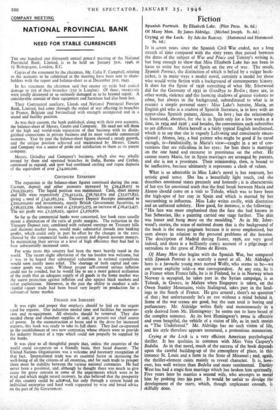Fiction
IT is _seven years since the Spanish Civil War ended, not a long stretch of time compared with the sixty years that passed between the dates of the subject of War and Peace and Tolstoy's writing it, but long enough to show that Miss Elizabeth Lake has not been in haste to write her novel of Spain on the eve of war. The result, Spanish Portra.t, the distinction of which is belied by a vulgar book- jacket, is in many ways a model novel, certainly a model for those who would write fiction with a background of contemporary history. It does for the Spain of 1936 something of what Mr: Isherwood. did for the Germany of 1931 in Goodbye to Berlin ; there are, in other words, violence and the looming shadows of greater violence to cdme, but always in the background, subordinated to what is in essence a simple personal story : Miss Lake's heroine, Maria, an English girl who is a student of Spanish literature, is in love with an upper-class Spanish painter, Alonso. In love ; but the relationship - is frustrated, abortive, for she is in Spain only for a few weeks at a time, in 1934 and 1936 ' • and besides the conventions each- subscribes to are different. Maria herself is a besides, typical English intellectual, which is to say that she is vaguely Left-wing and consciously eman- cipated; Alonso, lazy, a bad painter who might be good if he cared enough, is—fatalistically, in Maria's view—caught in a set of con- ventions that are ridicnlotts, in her eyes : for him there is Marriage on the one hand and recourse to prostitutes on the other. He cannot marry Maria, for in Spain marriages are arranged by parents, and she is not a prostitute. Their relationship, then, is bound to be ineffective, because ultimately it represents a clash of values.
What is so admirable in Miss Lake's novel is her restraint, hei artistic good sense. She has a beautifully light touch, and she describes emotional states precisely and honestly ; it is characterstic of her eye for emotional truth that the final break between Maria and Alonso should come on a visit to Toledo, which was to have been the high-spot of her stay in Spain and which is marred by her, succumbing to influenza. Miss Lake writes coolly, with discretion- and an unforced subtlety.. How good, for instance, is the following : "His face was more emphasised than the face she had known in San Sebastian, like a painting carried one stage further. The skin was looser and hung more on the moulding." As in Mr. Isher- wood's stories the sense of national doom that is the background of the book is the more poignant because it is never emphasised, but seen always in relation to the personal problems of the heroine. The description of Madrid during Easter, 1936, are very good indeed, and there is a brilliantly comic account of a pilgr:mage of surrealists to the grave of .Primo de Rivera.
Of Many Men also begins with the Spanish War, but compared with Spanish Portrait it is scarcely a novel at all. Mr. Aldridge's hero is a farouche young man named Wolfe, who seems to be—we are never explicity told—a war. correspondent. At any rate, lie is in France when France falls, he is in Finland, he is in Norway when Norway is occupied, he takes part in the Syrian campaign, is at Tobruk, in Greece, in Malaya when Singapore is taken, on the Owen Stanley Mountains, visits Stalingrad, takes part in the land- ings in the South of France. He gets around ; there's no question - of that; but unfortunately he's an eye without a mind- behind it., Some of the war scenes are good, but the sum total is boring and . - perfunctory. Mr. Aldridge writes flatly and monotonously in a style derived from Mr. Hemingway : he seems not to have heard Of the complex sentence. At -hi best Hetningway's prose is effecti7 and even beatItiful, the vehicle of a vision of life, as in such stories as "The Undefeated." Mr. Aldridge has no such vision of life, and his, style therefore appears unnatural, a pretentious mannerism.
Crying at the Lock is a very efficient American psychological thriller. It has qualities in common with Miss Vera Caspery's Bedelia. As in that novel, much of the success of the book depends upon the careful building-up of the atmosphere of place, in this instance St. Louis and a farm in the State of Missouri ; and, agaiit, the thriller-element exists mainly to reveal character. It is, how- ever, less well written than Bedelia and more sentimental. Dardey West has had a tragic first marriage which has broken him spiritually. Five years later he marries a second wife who attempts to mend him by probing into his past. It would wife, unfair' to divulge the development of the story, which, though unpleasant enough, skilfully done.






























 Previous page
Previous page